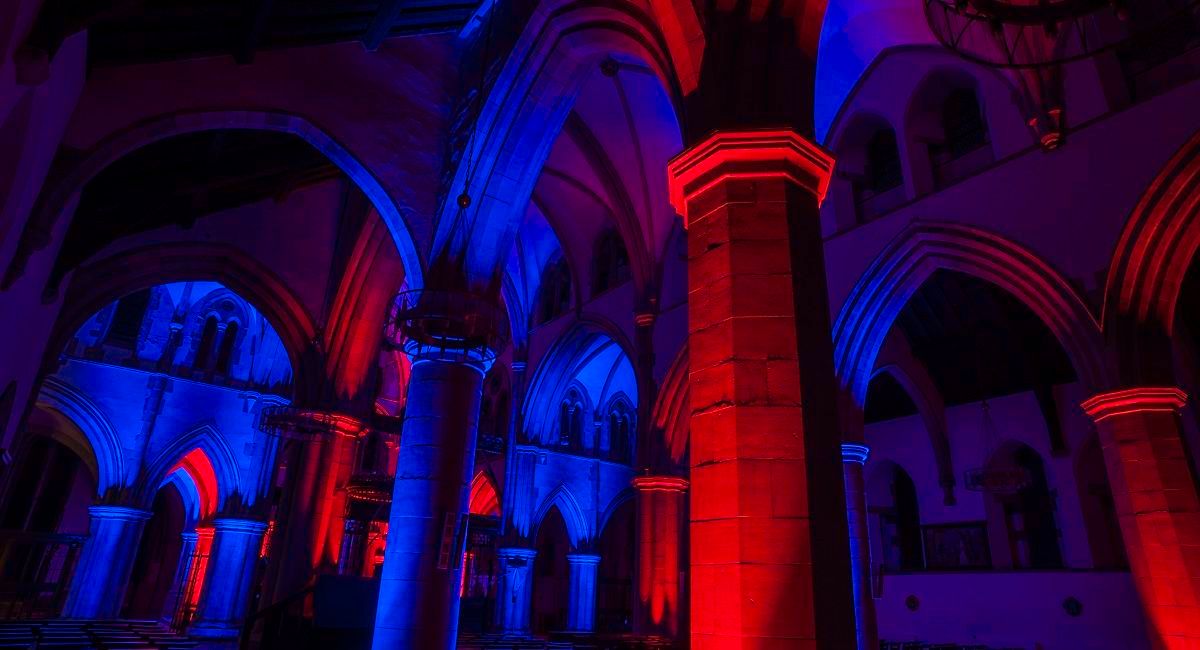The Blue Church vs. The Red Religion: The Battle for How We Make Sense
Something’s broken with the way our society makes sense of reality

Every Month I publish a newsletter called "The Jungle Gym."
It's a collection of ideas and resources to help you think clearer and work smarter.
You can check out previous issues and subscribe here.
Something’s broken with the way our society makes sense of reality. You may have first noticed it if you were blindsided by the news about Brexit, or the election of Donald Trump. Or maybe it was the Jeffrey Epstein saga that’s triggered your alarm bells. You’re not alone. Increasingly, lots of people are starting to sense that our existing institutions may not be up to the task of uncovering the truth.
Why is our existing sense-making system starting to crack?
What might be able to replace it?
One of the best thinkers I’ve encountered on the topic of sense-making is Jordan Hall. Recently, during a lengthy interview Hall laid out his perspective on the turmoil that’s taking place in our society. While I typically advise skepticism before listening to anyone who gets introduced as a “culture hacker,” Jordan is one of the clearest thinkers I’ve encountered on this topic and his ideas are worth understanding.
How we make sense
For most of our lifetimes, society has deciphered reality through a top-down process, which Hall calls "The Blue Church." This paradigm depends on a small number of trusted people to broadcast sensible narratives to a large number of people whose job is to listen. You can see this in the relationship between a news anchor and his audience or a professor and her students. Paraphrasing Hall on how this system works:
When it works well, the Blue Church endeavors to put into place various meritocratic filtering mechanisms to identify individuals who have achieved domain expertise. Those people are then charged with making sense of the world, and expressing that sense through various broadcast channels…
As the message makes its way to the masses, the system selects for those who are inclined to receive and act upon good opinion. For example, take the student. The professor expresses the lesson, and the student’s job is to listen, understand, map the meaningful components of the lesson, and respond effectively to queries about the lesson’s content.
To work, this system needs gate-keeper like newspapers, political parties and academic journals to ensure that undesirable ideas don’t end up infecting the society. This filtering process ensures that everyone has a common set of facts to understand and communicate reality. Through this process, the Blue Church has enabled humans to create unprecedented prosperity, cure diseases, and even put a man on the moon. However, this paradigm is not without its limitations.
Broadcast is limited in its capacity to perceive and respond to reality. What happens is that every layer of the hierarchy has to compress information. For example, if someone’s out in the field seeing what's going on with rain forest insects, and wants to share that information, he needs to port that information up to someone who's at a think tank who's porting it up to a policy-maker, who's porting it up to a legislative decision-maker. As the message goes up the chain it gets altered and simplified. So, at the very least, you're losing an enormous amount of information.
At any point in the chain, a gatekeeper might alter the meaning of a message or block it entirely. This doesn’t even require corrupt motives. It may be that a gatekeeper has simply misinterpreted a message or didn’t believe it to be true. Of course, it’s also possible to imagine plenty of scenarios in which gatekeepers aren’t incentivized to disseminate the truth.
As a message is broadcast to the public, it must often be simplified in order to stick in the minds of its intended audience. While the public is left with a general consensus on the facts, those facts often end up being a misrepresentation of reality.
The Blue Church finally has a formidable challenger: The Red Religion. Unlike the Blue Church, this new sense-making system uses a bottoms-up process of understanding reality. Often taking place in online forums, this new system uses collective decentralized intelligence with little mediation by gatekeepers. Each individual node of the network is responsible for both sensing information and broadcasting it. Once absorbed, other nodes can choose to amplify the signal (much like what I’m doing with Hall’s message).
Without these layers of gatekeepers it’s easier for groups of people to piece together an accurate picture of reality and disseminate it to the public. To see this in action, watch this account of how Shia LaBeouf inadvertently started a world wide game of capture the flag with a bunch of internet trolls.
While taking away the gatekeepers reduces the number of potential distortions to a message, it also provides openings for people to spread misinformation. During the last presidential election this sense-making system was hijacked by foreign actors to spread lies, sow discord and promote conspiracy theories. But it doesn’t require a nefarious foreign government to spread bad ideas. Since there is very little vetting, it’s much easier for ill informed people to get their hands on a metaphorical megaphone.
Right now, these two sense-making systems are going to war. Blue Church institutions like the New York Times report on the toxic practices that have emerged in the Red Religion. Political parties attempt to rig primaries in favor of Blue Church candidates. Meanwhile, the Red Religion fights back by spreading evidence of institutional bias and sowing mistrust.
It’s easy to confuse this fight with partisan politics or the culture wars. But there’s something more important going on here. While right now the red religion is primarily used by extreme political groups it’s worth separating the people from the practices. To some degree, I suspect existing Blue Church institutions may be using the power of the culture wars to distract from this larger fight and engender loyalty to our existing sense-making process. While it is still unclear how this battle will play out, I believe it will only intensify.
Success in this new paradigm, will no longer depend on our ability to receive and retain the sensible broadcasted narrative. Instead we will need to develop the ability to decide which ideas to pay attention to, adopt, and amplify. Nutrition is a great example of this. In a top-down system, all we had to do was remember and adhere to the wisdom of the nutrition pyramid. In this bottoms-up system each of us will need to compare diets ranging from Keto to Carnivore to Vegan and decide for ourselves what will keep us healthy. While I suspect this transition will be scary, ultimately I think it will incentivize us all to start viewing reality with clarity and express it with more honesty.
